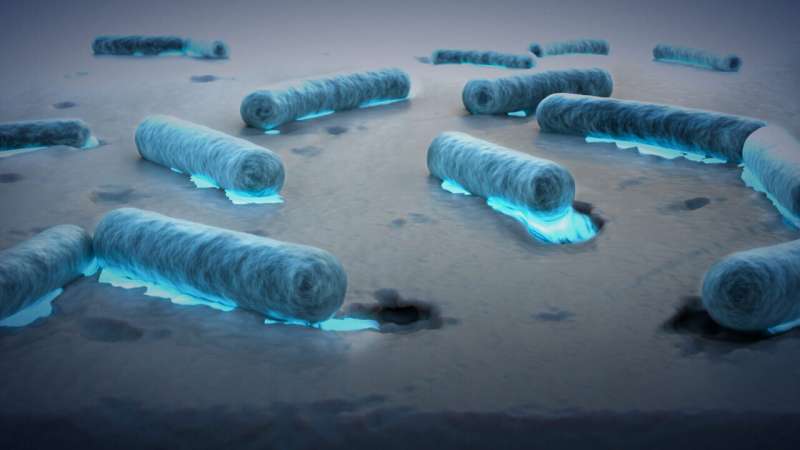Science
Marine Bacteria Evolve to Digest Plastic, Study Reveals

Marine bacteria capable of breaking down plastic have been identified in oceans worldwide, as detailed in a recent study from the King Abdullah University of Science and Technology (KAUST). The research reveals that these bacteria have evolved to utilize polyethylene terephthalate (PET), a widely used plastic found in everyday items like bottles and textiles. Published in The ISME Journal on November 4, 2025, the findings signify a significant advancement in understanding the ocean’s microbial response to plastic pollution.
At the heart of this discovery is a distinct feature of the PET-hydrolyzing enzyme, referred to as PETase. Researchers identified a structural characteristic known as the M5 motif, which acts like a fingerprint indicating the enzyme’s functionality. According to Carlos Duarte, a marine ecologist and co-leader of the study, “The M5 motif acts like a fingerprint that tells us when a PETase is likely to be functional, able to break down PET plastic.” This insight provides a clearer understanding of how these enzymes evolved from other types of hydrocarbon-degrading enzymes.
Historically, PET was regarded as nearly indestructible in natural environments. The narrative began to shift in 2016, when scientists found a bacterium in a Japanese recycling facility that had developed a PETase capable of decomposing the plastic. The question of whether similar enzymes existed in marine environments remained unanswered until now.
The research team employed advanced techniques, including AI-based structural modeling and extensive genetic analysis, to investigate the presence of the M5 motif in various marine bacteria. Their analysis encompassed over 400 ocean samples from diverse locations across the globe, revealing that nearly 80% of the tested waters contained bacteria with functional versions of the M5 motif. Notably, this includes areas heavily polluted with plastic as well as nutrient-poor depths up to two kilometers below the surface.
The implications of this research extend beyond environmental science. Intikhab Alam, a senior bioinformatics researcher who co-led the study, highlights that the ability to consume synthetic carbon could provide these bacteria a crucial survival advantage in the deep ocean, where natural carbon sources are scarce. This microbial adaptation serves as an early response to human-generated plastic waste.
While the emergence of these enzymes offers a glimmer of hope, Duarte cautions that nature’s ability to address plastic pollution is limited. “By the time plastics reach the deep sea, the risks to marine life and human consumers have already been inflicted,” he warns, underscoring the urgency of addressing plastic waste on a larger scale.
On land, the discovery of these naturally occurring PET-degrading enzymes could accelerate the development of industrial applications for closed-loop recycling systems. Duarte suggests that understanding the structural nuances of the M5 motif may enable researchers to optimize these enzymes for practical use in waste treatment facilities and home recycling systems.
As the world grapples with the pressing issue of plastic pollution, scientists may find unexpected allies in the depths of the ocean—bacteria that are already transforming waste into sustenance. The study not only sheds light on the microbial response to human impact but also points toward potential solutions for managing the plastic crisis.
For more details, refer to the research article by Intikhab Alam et al., titled “Widespread distribution of bacteria containing PETases with a functional motif across global oceans,” published in The ISME Journal (2025). DOI: 10.1093/ismejo/wraf121.
-

 Technology5 months ago
Technology5 months agoDiscover the Top 10 Calorie Counting Apps of 2025
-

 Technology2 weeks ago
Technology2 weeks agoOpenAI to Implement Age Verification for ChatGPT by December 2025
-

 Health3 months ago
Health3 months agoBella Hadid Shares Health Update After Treatment for Lyme Disease
-

 Health3 months ago
Health3 months agoAnalysts Project Stronger Growth for Apple’s iPhone 17 Lineup
-

 Health3 months ago
Health3 months agoErin Bates Shares Recovery Update Following Sepsis Complications
-

 Technology5 months ago
Technology5 months agoDiscover How to Reverse Image Search Using ChatGPT Effortlessly
-

 Technology3 months ago
Technology3 months agoElectric Moto Influencer Surronster Arrested in Tijuana
-

 Technology2 months ago
Technology2 months agoDiscover 2025’s Top GPUs for Exceptional 4K Gaming Performance
-

 Technology5 months ago
Technology5 months agoMeta Initiates $60B AI Data Center Expansion, Starting in Ohio
-

 Technology5 months ago
Technology5 months agoRecovering a Suspended TikTok Account: A Step-by-Step Guide
-

 Health5 months ago
Health5 months agoTested: Rab Firewall Mountain Jacket Survives Harsh Conditions
-

 Lifestyle5 months ago
Lifestyle5 months agoBelton Family Reunites After Daughter Survives Hill Country Floods









